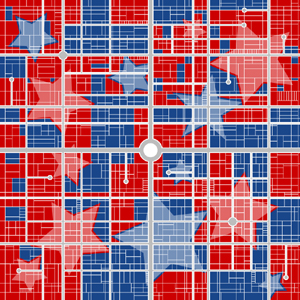Supreme Court will consider racial gerrymandering case; could standing issue affect health law?

The U.S. Supreme Court on Tuesday agreed to consider the constitutionality of 11 state legislative districts in Virginia that were drawn in 2011 to maintain a black voting-age population of at least 55 percent.
It’s not the first time the case was before the U.S. Supreme Court, report USA Today, Courthouse News Service, the Richmond Times-Dispatch, SCOTUSblog and the Washington Post.
In March 2017 the Supreme Court said a special three-judge federal district court applied the wrong legal test in determining whether race predominated in the drawing of the 11 Virginia districts. If race is the predominant factor, courts use the more exacting standard of strict scrutiny to determine whether the redrawn lines served a compelling government interest.
The March decision held that a 12th redrawn district satisfies the equal protection clause. The Supreme Court ordered the district panel to take another look at the 11 other districts.
On remand, the three-judge federal district panel found that race was improperly used to draw boundaries in the 11 districts. The district court appointed a special master to redraw lines, and the process is under way, according to the Washington Post and the Times-Dispatch. Republicans currently hold a 51-49 majority in Virginia’s House of Delegates.
The Virginia House and its Republican speaker, Kirk Cox, filed the appeal, according to SCOTUSblog. In a separate brief, several Virginia state officials maintained that the House of Delegates and its speaker had no standing to appeal after the state’s Democratic attorney general declined to take the case to the Supreme Court.
The U.S. Supreme Court asked the parties to address the standing question.
According to ThinkProgress, the standing issue could affect a lawsuit attacking the Affordable Care Act brought by 20 Republican governors and state attorneys general. A Department of Justice brief in the case maintains that protections in the law for people with pre-existing conditions are invalid because they are tied to a tax penalty for uninsured people that was later repealed by Congress.
The lawsuit is being heard by a judge who is expected to strike down the Affordable Care Act, according to ThinkProgress. Seventeen states filed a brief seeking to defend the law, followed by a Texas brief seeking to limit any decision to the 20 plaintiff states. A standing decision in the racial gerrymander case could restrict the right of the 17 intervenor states to appeal, according to ThinkProgress.
The Supreme Court redistricting case is Virginia House of Delegates v. Bethune-Hill. How Appealing links to additional coverage.



